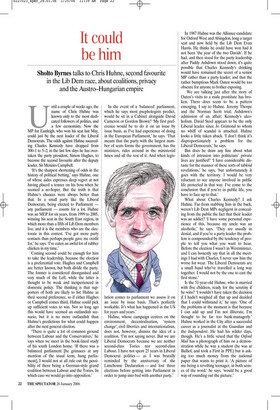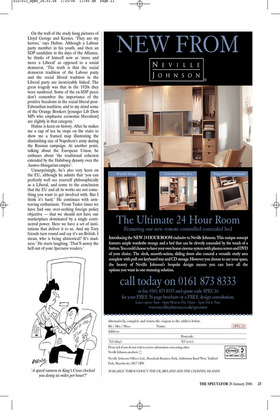It could be him
Sholto Byrnes talks to Chris Huhne, second favourite in the Lib Dem race, about coalitions, privacy and the Austro–Hungarian empire Until a couple of weeks ago, the name of Chris Huhne was known only to the most dedicated followers of politics, and a few economists. Now the MP for Eastleigh, who won his seat last May, could just be the next leader of the Liberal Democrats. The odds against Huhne succeeding Charles Kennedy have dropped from 300–1 to 5–2; in the last few days he has overtaken the party president, Simon Hughes, to become the second favourite after the deputy leader, Sir Menzies Campbell.
‘It’s the sharpest shortening of odds in the history of political betting,’ says Huhne, one of whose aides expresses deep regret at not having placed a tenner on his boss when he seemed a no-hoper. But the truth is that Huhne’s chances were always better than that. In a small party like the Liberal Democrats, being elected to Parliament any parliament — counts for a lot. Huhne was an MEP for six years, from 1999 to 2005, winning his seat in the South East region, in which more than a fifth of Lib Dem members live; and it is the members who are the electorate in this contest. ‘I’ve got more party contacts than perhaps people gave me credit for,’ he says. ‘I’ve eaten an awful lot of rubber chicken in my time.’ Coming second could be enough for him to take the leadership, because the election is a preferential vote. Hughes and Campbell are better known, but both divide the party. The former is considered disorganised and very much of the Left, while the latter is thought to be weak and inexperienced in domestic policy. The thinking is that supporters of both are likely to list Huhne as their second preference, so if either Hughes or Campbell comes third, Huhne could pick up sufficient votes to win. Not so long ago this would have seemed an outlandish scenario, but it is no more outlandish than Huhne’s predictions for what could happen after the next general election.
‘There is quite a lot of common ground between Labour and the Conservatives,’ he says when we meet in the book-lined study of his south London home. ‘If there was a balanced parliament [he grimaces at any mention of the usual term, hung parliament], I would not at all rule out the possibility of there being a German-style grand coalition between Labour and the Tories. In which case we would go into opposition.’ In the event of a ‘balanced’ parliament, which he says most psephologists predict, would he sit in a Cabinet alongside David Cameron or Gordon Brown? ‘My first preference would be to do it on an issue by issue basis, as I’ve had experience of doing in the European Parliament,’ he says. ‘That means that the party with the largest number of seats forms the government, has the ministers, rides around in the ministerial limos and all the rest of it. And when legis lation comes to parliament we assess it on an issue by issue basis. That’s perfectly workable. It’s what has happened in the US for years and years.’ Huhne, whose campaign centres on the environment, decentralisation, ‘system change’, civil liberties and internationalism, does not, however, dismiss the idea of a coalition. ‘I’m not saying never. But we are Liberal Democrats because we are neither second-class Tories nor second-class Labour. I have not spent 25 years in Liberal Democrat politics — as I was brutally reminded by the anniversary of the Limehouse Declaration — and lost three elections before getting into Parliament in order to jump into bed with another party.’ In 1987 Huhne was the Alliance candidate for Oxford West and Abingdon, long a target seat and now held by the Lib Dem Evan Harris. He thinks he could have won had it not been ‘the year of the two Davids’. If he had, and then stood for the party leadership after Paddy Ashdown stood down, it’s quite possible that Charles Kennedy’s drinking would have remained the secret of a senior MP rather than a party leader; and that the rather bumptious Mark Oaten would be too obscure for anyone to bother exposing.
We are talking just after the story of Oaten’s visits to a male prostitute has broken. There does seem to be a pattern emerging, I say to Huhne. Jeremy Thorpe and the Norman Scott trial; Ashdown’s admission of an affair; Kennedy’s alcoholism. David Steel appears to be the only Liberal leader since Jo Grimond to whom no whiff of scandal is attached. Huhne looks a little taken aback. ‘I don’t think it’s disproportionately a problem for the Liberal Democrats,’ he says.
But does he draw any line about what kinds of intrusion into politicians’ private lives are justified? ‘I have considerable distaste for the manner of these sorts of tabloid revelations,’ he says, ‘but unfortunately it goes with the territory. I would be very reluctant to see anyone involved in public life protected in that way. I’ve come to the conclusion that if you’re in public life, you have to face up to that.’ What about Charles Kennedy? I ask Huhne. Far from stabbing him in the back, weren’t Lib Dem MPs negligent in concealing from the public the fact that their leader was an addict? ‘I have some personal experience of this, because my uncle was an alcoholic,’ he says. ‘They are usually in denial, and if you’re a party leader the problem is compounded by the tendency of people to tell you what you want to hear. Before the election I wasn’t in Westminster, and I can honestly say that in all the meetings I had with Charles, I never saw him the worse for wear. The Liberal Democrats are a small band who’ve travelled a long way together. I would not be the one to cast the first stone.’ Is the 51-year-old Huhne, who is married with five children, ready for the scrutiny if he wins? ‘I wouldn’t have taken the decision if I hadn’t weighed all that up and decided that I could withstand it,’ he says. ‘One of the problems at the moment is that because I can add up and I’m not illiterate, I’m thought to be far too bank-managerly.’ Huhne worked in the City after a successful career as a journalist at the Guardian and the Independent. He had his wilder days, though. He’s a little vexed that the Oxford Mail has a photograph of him on a demonstration while he was a student (he was at Balliol, and took a First in PPE) but is asking too much money from the national paper that wants to print it. ‘A picture of me being a revolting teenager, in both senses of the word,’ he says, ‘would be a good way of rounding out the picture.’ On the wall of the study hang pictures of Lloyd George and Keynes. ‘They are my heroes,’ says Huhne. Although a Labour party member in his youth, and then an SDP candidate in the days of the Alliance, he thinks of himself now as ‘more and more a Liberal’ as opposed to a social democrat. ‘The truth is that the social democrat tradition of the Labour party and the social liberal tradition in the Liberal party are inextricably linked. The great tragedy was that in the 1920s they were sundered. Some of the ex-SDP peers don’t remember the importance of the positive freedoms in the social liberal postEdwardian tradition, and to my mind some of the Orange Bookers [younger Lib Dem MPs who emphasise economic liberalism] are slightly in that category.’ Huhne is keen on history. After he makes me a cup of tea he stops on the stairs to show me a framed map illustrating the diminishing size of Napoleon’s army during the Russian campaign. At another point, talking about the European Union, he enthuses about ‘the traditional cohesion extended by the Habsburg dynasty over the Austro–Hungarian empire’.
Unsurprisingly, he’s also very keen on the EU, although he admits that ‘you can perfectly well see yourself philosophically as a Liberal, and come to the conclusion that the EU and all its works are not something you want to get involved with. But I think it’s hard.’ He continues with armwaving enthusiasm. ‘From Tudor times we have had one over-arching foreign policy objective — that we should not have our marketplace dominated by a single continental power. Here we have a set of institutions that deliver it to us. And my Tory friends turn round and say it’s un-British. I mean, who is being ahistorical? It’s madness.’ He starts laughing. ‘That’ll annoy the hell out of your Spectator readers.’























































 Previous page
Previous page